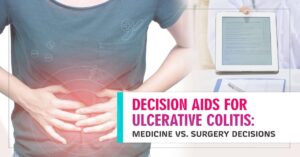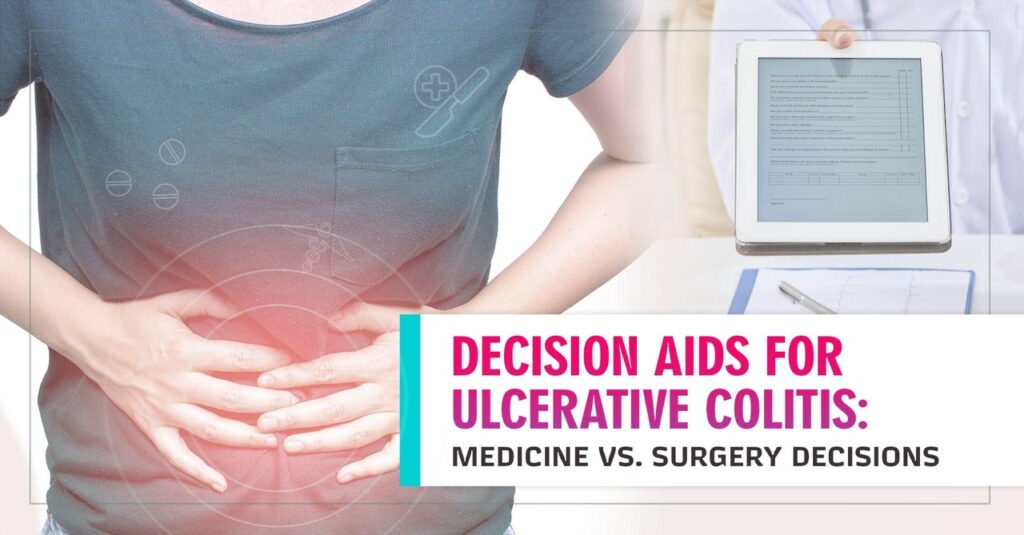
Decision Aids for Ulcerative Colitis: Medicine vs. Surgery Decisions
Welcome back to our series on Patient Decision Aids. In our first post, we explored how communication gaps in vision care can lead to frustration and poor outcomes. Today, we’re examining a much more complex scenario: helping people with Ulcerative Colitis navigate one of the most difficult decisions they may face—whether to continue medical treatment or undergo surgery.

When Treatment has a life-changing crossroads
Imagine living with Ulcerative Colitis for years, managing your condition with medications that once gave you hope. Then your doctor suggests it might be time to consider surgery. The medications aren’t controlling your symptoms like they used to, or perhaps the side effects are becoming unbearable. Suddenly, you’re facing a decision that could reshape your entire life.
This isn’t simply about choosing between two medical options—it’s about weighing the quality of life against personal values, considering family dynamics, work impacts, and personal concerns about body image and relationships. For many patients, this decision gets delayed or avoided altogether, not because they’re indecisive, but because they lack the tools to properly evaluate their options.
The Sheffield Breakthrough: Listening to Patients First
Professor Alan Lobo and his research team at Sheffield Teaching Hospitals recognized this exact challenge. Rather than creating another generic patient brochure filled with medical jargon, the Sheffield team took a different approach. They started by asking the people who matter most: patients themselves.
Through careful research, they discovered what information patients actually wanted when facing these life-changing decisions.
For medical treatment, patients needed honest answers about:
- Long-term benefits and risks of continuing medications
- The reality of ongoing hospital visits and their impact on daily life
- Effects on their ability to have children
- Whether they’d need steroid treatment
- How treatment would affect their personal relationships
For surgery, the answers to these concerns were equally crucial:
- What living with a stoma actually entails day-to-day
- How surgery might disrupt their work and family life
- Effects on intimate relationships and reproductive health
- The risks and benefits of different surgical options
Beyond Information: Creating Space for What Matters Most
What makes the Sheffield decision aid particularly powerful isn’t just the information it provides—it’s how it acknowledges that medical decisions are deeply personal. The tool includes dedicated space for patients to write down their own thoughts and feelings, recognizing that the “right” choice varies dramatically from person to person.
One patient might prioritize avoiding surgery at all costs, willing to accept the ongoing burden of medications. Another might feel ready to pursue surgery if it means potentially reclaiming control over their life. Neither choice is inherently better—but both require honest conversation about personal values and life goals.
The team’s research, supported by Crohn’s & Colitis UK, resulted in an illustrated booklet that helps patients identify what truly matters to them before making this significant decision. You can learn more about their comprehensive approach on the Crohn’s & Colitis UK research page.
A Blueprint for Patient-Centered Care
The Sheffield team partnered with patients and healthcare professionals throughout the development process, testing and refining the decision aid multiple times. This collaborative approach ensured the final tool addressed real concerns rather than what researchers assumed patients needed.
The result goes far beyond a simple informational brochure. It’s a structured conversation starter that helps patients explore their own values while providing evidence-based information about treatment options. Most importantly, it facilitates better discussions between patients and their healthcare teams, ensuring decisions are made together rather than imposed from above.
At Bazis Americas, we see this as exactly the kind of innovation healthcare needs. Decision aids don’t replace medical expertise—they enhance it by creating informed, engaged patients ready to work collaboratively with their healthcare teams.
In our next blog post, we’ll explore how decision aids are being implemented across different medical specialties and examine what makes some more effective than others.


